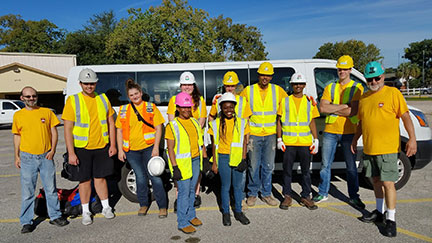
Terri Norton, associate professor of construction engineering, took a group of engineering students to Houston Oct. 18-22 to help with the recovery efforts after Hurricane Harvey. Here is her quick account of the trip:
Our service trip to Houston was a success. I took eight students down to Houston to assist with the repair of homes damaged by Hurricane Harvey. We partnered with the Seventh Day Adventists Disaster Response Team from Nebraska and the Little York Iglesia Adventista Del Septimo Dia (local church) to repair two homes of their members. Our activities included drywall work, removal and rebuilding of a front deck/porch and subfloor repairs. On Saturday, we drove down to Galveston, Texas, so the students could see the coastline and type of residential construction along the coast.
For photos from the trip, click on either of the following links:
https://photos.app.goo.gl/WYjnncMTy29ahVj52
https://drive.google.com/open?id=0B82FvsXcA3rETjNCc3dwRjFNUE0
For a video shared by one of the partners with Adventists Disaster Response, go to:
https://youtu.be/iDXxMBOhlnU
-----------------
A $500,000 research project involving Biological Systems Engineering faculty and funded by the United States Department of Agriculture and the Daugherty Water for Food Global Institute will deploy drone aircrafts in search of improved crop irrigation efficiency.
The project will conduct regular flights of unmanned aircraft equipped with multispectral and thermal infrared imaging sensors, from planting to harvest, and also explore a new concept in which an unmanned aircraft is used to communicate with in-field soil water content and canopy temperature sensors.
“Essentially, we will be able to economically collect near real-time crop and soil water content data, that are not currently available, and use these data to create water management prescriptions for newer variable rate center pivot irrigation systems,” according to Wayne Woldt, one of the investigators, director of the NU-AIRE laboratory, and an associate professor of Biological Systems Engineering. "With this sophisticated level of detail, farmers can respond quickly and more accurately to their soil conditions, increasing crop production while maximizing their water use efficiency."
http://myemail.constantcontact.com/Research-using-drones-to-improve-water-use--increase-crop-yields.html?soid=1115209281618&aid=-vkYDP5Zwgg
-----------------
David Gee, a civil engineering graduate student working with Dr. Chungwook Sim, has been awarded the Precast/Prestressed Concrete Institute's Daniel P. Jenny Research Fellowship for 2017-18. Gee is a master’s student on the Scott Campus working to eliminate rebar splicing in transverse joints of precast full depth bridge deck panels.
https://engineering.unl.edu/chungwook-sims-research-group-receives-daniel-p-jenny-fellowship-precast-concrete-institute/
-----------------
Chris Tuan, professor of civil engineering, has recently gained international attention for his research into conductive concrete, including being featured in an article earlier this month on the “All Tech Considered” section of the National Public Radio (NPR) web site – npr.org
http://www.npr.org/sections/alltechconsidered/2017/10/01/553756878/winter-is-coming-what-if-roads-and-runways-could-de-ice-themselves